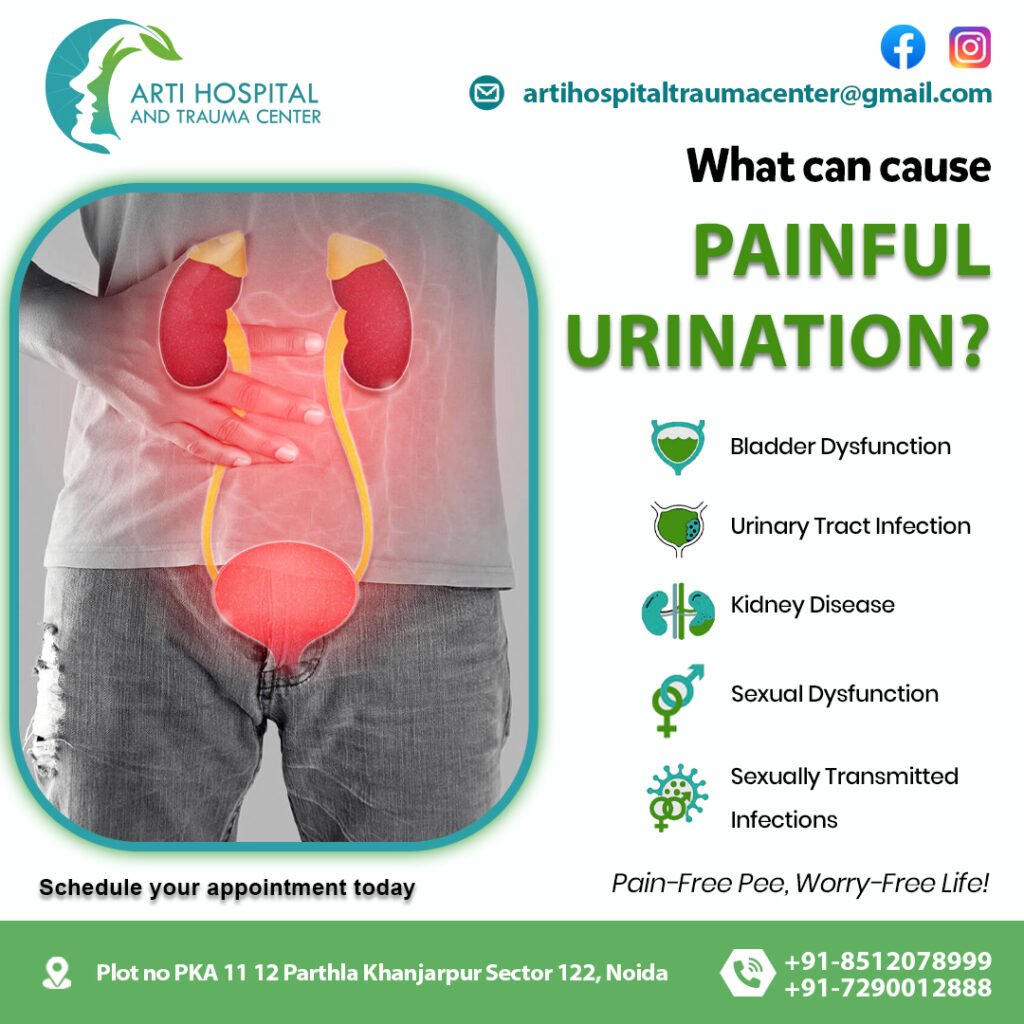Painful urination, also known as dysuria, can be a distressing condition for many individuals. It can be caused by a variety of factors, from infections to irritation or even an underlying medical condition. If you’re dealing with this uncomfortable symptom, you’re likely wondering whether over-the-counter (OTC) medications can provide relief. We’ll explore the potential benefits of OTC treatments for painful urination, their effects, and why seeking professional help at a trusted clinic like Arti Hospital & Trauma Center in Best Painful Urination Sector 122, Noida might be a good choice.
For fast information direct chat with us on Whats App.
What Causes Painful Urination?
Before discussing treatment options, it’s essential to understand the potential causes of painful urination. Some of the most common reasons for dysuria include:
- Urinary Tract Infection (UTI): A bacterial infection in any part of the urinary system can cause pain or a burning sensation while urinating.
- Sexually Transmitted Infections (STIs): Certain STIs like chlamydia or gonorrhea can also lead to painful urination.
- Irritation: Soap, creams, or even certain hygiene products may irritate the urethra, causing discomfort during urination.
- Bladder or Kidney Stones: These can cause pain when passing urine due to blockages or irritations.
- Prostatitis (in men): Inflammation of the prostate gland can result in painful urination.
- Dehydration: Not drinking enough water can concentrate urine, making it painful to urinate.
If you’re experiencing painful urination, it’s important to seek proper medical attention. Arti Hospital & Trauma Center, located in the heart of Best Painful Urination Sector 122, Noida, is a trusted clinic where specialists can help diagnose and treat the underlying cause of your discomfort.
Can OTC Medications Help?
When dealing with painful urination, many people turn to OTC medications as a first line of defense. These medications are easily accessible and can provide temporary relief from symptoms. But, do they actually work? Let’s dive into some common OTC options:
- Pain Relievers (Analgesics)
One of the most common OTC medications used to manage the pain associated with dysuria is an analgesic. These medications, such as acetaminophen (Tylenol) or ibuprofen (Advil), can help reduce the pain and discomfort associated with urination. While these medications do not treat the underlying cause, they can provide temporary relief and allow you to manage the pain while waiting for a more definitive treatment plan. - Urinary Pain Relief Products
There are also specific OTC medications designed to treat urinary discomfort. One of the most well-known options is phenazopyridine (brand names like Azo or Pyridium). This medication works by soothing the lining of the urinary tract, providing immediate relief from burning and pain while urinating. However, this medication should only be used for a short period, typically no more than two days, as it does not address the root cause of the pain, such as an infection or stone. - Herbal Remedies and Supplements
Some people opt for herbal remedies and supplements to treat painful urination. Ingredients like cranberry extract, which is often marketed to support urinary health, may offer some benefit in preventing urinary tract infections (UTIs) but should not be used as a sole treatment. While cranberry may help prevent future infections, it is not a cure for ongoing painful urination. Consulting a healthcare professional at Arti Hospital & Trauma Center in Best Painful Urination Sector 122, Noida, can guide you toward the best course of action.
Benefits of OTC Medications
Over-the-counter treatments for painful urination can be highly beneficial in specific situations, especially when the symptoms are mild or temporary. The key benefits include:
- Immediate Relief: OTC medications like analgesics and urinary pain relievers can provide quick relief from the discomfort associated with painful urination.
- Convenience: These medications are widely available without a prescription, making them a convenient option for those who need relief right away.
- Affordability: Compared to prescription medications or doctor visits, OTC options tend to be more affordable and accessible.
What Are the Risks and Side Effects?
While OTC medications can provide temporary relief, they are not without risks. Using these medications without addressing the underlying cause of painful urination can lead to further complications. Here are some potential risks:
- Misdiagnosis: Using OTC medications may mask symptoms without treating the actual cause. If the underlying cause is an infection, using an analgesic alone could delay proper treatment, leading to more severe health issues.
- Side Effects: Medications like phenazopyridine may cause side effects such as headaches, dizziness, or changes in urine color. Although these adverse effects are typically transient, they should be closely watched.
- Overuse: Relying too heavily on OTC medications, especially without medical guidance, can result in overuse, which may lead to complications like liver damage (in the case of excessive acetaminophen use) or gastrointestinal issues (with prolonged ibuprofen use).
When to See a Doctor
While OTC medications can be helpful in managing symptoms, they are not a substitute for professional medical care. If you experience any of the following symptoms, it’s essential to seek medical attention at Arti Hospital & Trauma Center in Best Painful Urination Sector 122, Noida:
- Fever: A fever along with painful urination can indicate a serious infection, such as a kidney infection, which requires immediate medical attention.
- Blood in Urine: If you notice blood in your urine, it could signal an infection or the presence of stones, both of which need professional treatment.
- Persistent Symptoms: If your painful urination persists for more than a few days, or if OTC medications are not providing adequate relief, it’s time to consult a doctor.
- Severe Pain: Intense pain that doesn’t subside with OTC medication should never be ignored, as it could indicate a more serious condition that requires medical intervention.
Conclusion
Painful urination can be uncomfortable and disruptive, but with proper treatment, the discomfort can be alleviated. Over-the-counter medications may provide short-term relief from the symptoms, especially for mild cases, but they do not address the root cause. If you are struggling with painful urination, seeking professional help at Arti Hospital & Trauma Center in Best Painful Urination Sector 122, Noida can ensure that you receive the appropriate care. Early diagnosis and treatment can prevent further complications and help you get back to feeling better as soon as possible.
For more information about our Best Painful Urination Sector 122, Noida , visit our website at artihospitalandtrumacenter.com.



